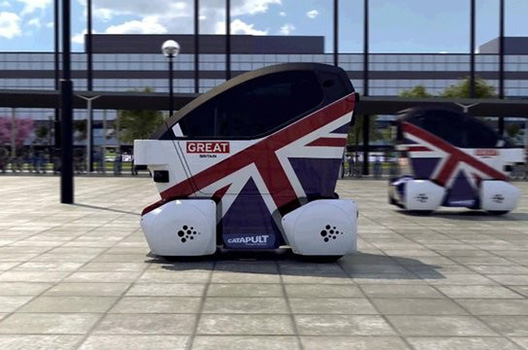 In February, the British Government began trials of driverless cars in four UK cities. And while the vehicles currently being tested are small, slow, and restricted to pedestrianized streets and plazas, initial impressions make one thing clear: the cars of the future will not only look very different, but will be used differently to those of today. For the United States, this will mean the upending of longstanding cultural and social norms attributed to the American car.
In February, the British Government began trials of driverless cars in four UK cities. And while the vehicles currently being tested are small, slow, and restricted to pedestrianized streets and plazas, initial impressions make one thing clear: the cars of the future will not only look very different, but will be used differently to those of today. For the United States, this will mean the upending of longstanding cultural and social norms attributed to the American car.
Indeed, since becoming a mass consumer good, the car has become a key facilitator of socioeconomic change, and a core symbol of modern American culture. Yet today, millions of Americans already use ride sharing platforms like Uber or short term rental services like Zipcar, while Uber’s announcement of its plans to develop driverless cars evokes images of fleets of autonomous on demand vehicles. Developments like ride sharing technology, and in the not too distant future, driverless cars, are thus poised to radically alter our perception of the car and its place in contemporary American culture.
The car began life in America at the beginning of the twentieth century as an exclusive luxury good. Indeed, so expensive and exclusive were early cars, that debates over their use were almost always heavily colored with class based rhetoric. Drivers were viewed as privileged and reckless, while pedestrians and opponents of cars were seen as hostile, lower class luddites.
With the introduction of mass production techniques, however, the car became a mass consumer good that more and more people were able to afford. By 1960, there was approximately one car for every three people. The car subsequently became one of the key catalysts of urbanization, and widespread car ownership became a prominent indicator and facilitator of the rapid expansion of the middle class.
Notably, the car also assumed a uniquely prominent position within modern American culture. Across American television, film, and music, the car earned a special place as a celebrated image of a distinctively American sense of individualism and self-determination.
Technological changes, however, many of which we have already begun to see today, will lead future generations to use cars in fundamentally different ways and to conceive of the car in terms of different social and cultural frameworks. Already, new car purchases are down amongst millennials. Given the relatively inexpensive mobility offered by services like Uber, Lyft, or Zipcar, the dream of individual car ownership is just not as relevant as it once was.
This development will become even more pronounced with the emergence of driverless cars; as control is ceded to computers, the act of driving will become less exciting and empowering, and the prospect of ownership, less interesting. That computing giant Apple is rumored to be developing its own driverless technology is surely a sign of these changes.
In this context, the car will no longer be a product we own as individuals, nor will we associate it with values like independence and individualism. Instead, the car will become a collective means of transportation, associated with short term and shared rides and rentals, and with the act of driving delegated to a computer.
These kinds of changes are not unprecedented. Horse riding culture, once integral to American transportation and the American economy, is now the exclusive domain of the very wealthy or the very rural. Likewise, in coming decades, car culture will change as it adapts to technological change.
Daniel Pearson is a Spring 2015 intern with the Strategic Foresight Initiative. He recently received his bachelor of international and global studies, majoring in American studies and history, from the University of Sydney.
Image: Driverless vehicles like the one pictured here are currently being trialed in Greenwich, London, as a means of helping commuters, shoppers, and the elderly travel short distances. (Photo/Creative Commons)
